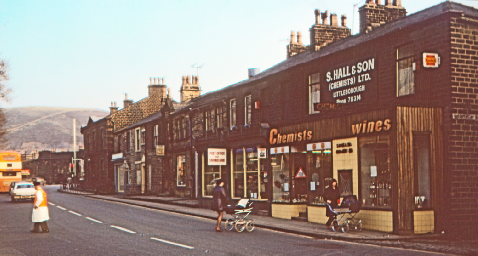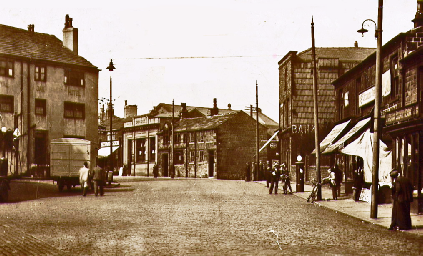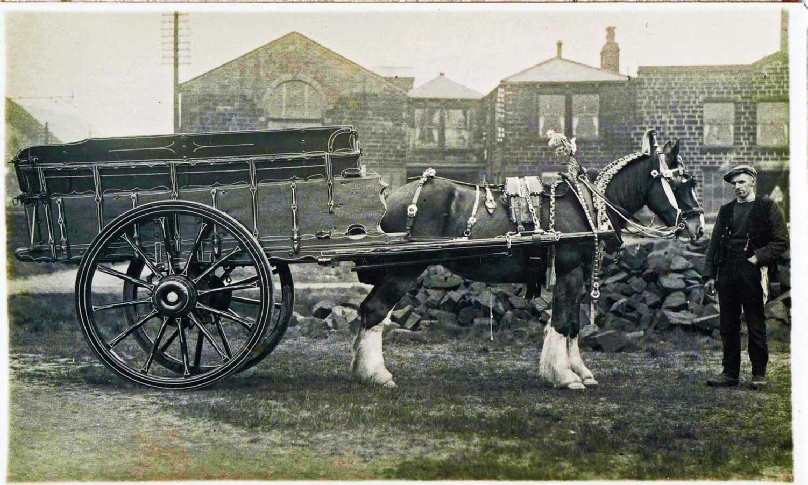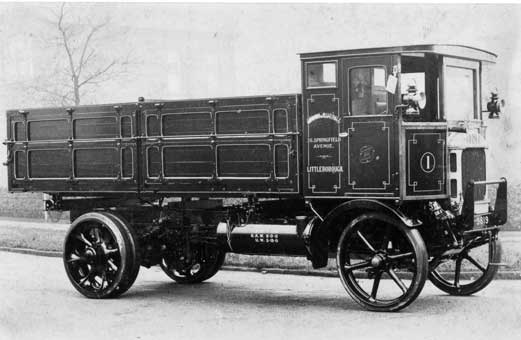



William Burrill - from horse Drawn Carts to 8 wheel trucks
William Burrill arrived in Lancashire from Yorkshire and initialy worked in farming around 1880 He later moved to Sladen Fold Farm continuing as a milk producer but also doing some carrying with horse and lorry for Fothergill and Harvey (pictured). Gradually, the transport side of the business grew and milk production was discontinued. Eventually he had 40 horses carrying coal from Littleborough Sidings to local mills. By now he was the transport operator to Rochdale Canal Company moving good from the canal wharf to local mills and cotton pieces to the wharf for barge transpoprt to Manchester. During the First World War, this mode of transport proved too slow and a lot of Khaki cloth was taken direct to Manchester changing horses at Middleton to speed up the job. After the war the Rochdale Canal Co ceased to operate as a carrier.
In 1922 William Burrill bought 2 Maudsley lorries to carry cloth into Manchester. This was followed by a slump in the Cotton Industry wirh many of the mills working only 2 or 3 days per week. With no work available his son Henry had to resort to ‘Tramping’, that is to pick up a load to any destination and when that had been delivered taking another load to some place not particularly near home. During the journeys it was noticeable that the West Riding was more prosperous than lancashire. William was able to tske over a small transport business in Bradford and made many contacts in the import and export trade which resulted in him running mainly between Liverpool and Birkenhead and the West Riding carrying manufactured goods on the on the outward journey and wool from various ports of the world on the return Journey. William Burrill died in 1925.
Henry, his son, then tookover his fleet which by then had grown to 5 vehicles, all Maudsleys 4 wheelers. Henry, like his father was very far sighted and ebterprising, consequently as soon as 6 wheel lorries were on the market Henry bought two, each costing £1,000 in 1929. The business continued to prosper and in 1931 he was buying AEC vehicles with pnuematic tyres and diesel engines, diesel costing 4d per gallon whereas petrol was 10 pence per gallon. This continued until the outbreak of the Second World War by which time he had a fleet of 25 vehicles employing over 25 men. These were based at the Canal Wharf in Littleborough, a convenient half way point between Merseyside and the West Riding.



Burrill 8 wheel lorry loaded with wool in BRS ownership
After Dunkirk when things became very serious the transport industry was divided into sections and was required to move ordanance and materials concerned with the war effort. Part of this was moving Hurricane Fighters to the north of Scotland for shipment to Russia.
Shortly after the war, a Labour Governmentwas was elected and the business was nationalised. Henry then retired early . Henry Burrill died in 1978. William, his son, worked for some years with British Road Services but in 1957 william was able to take over another transport business in Rochdale which he sold on as a going concern in 1988, then he too retired.
Details from a letter from the family to John Street for his book “The Story of Littleborough”
Next page: Richard Jay






